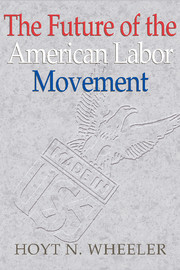Book contents
- Frontmatter
- Contents
- Foreword
- Introduction by Lynn R. Williams
- 1 A Future for the American Labor Movement?
- 2 Industrial Relations in a Time of Change
- 3 A Survey of American Union Strategies
- 4 The Old Reformist Unionism: The Noble Order of the Knights of Labor
- 5 The New Reformist Unionism: CAFE
- 6 A New Version of an Old Reformist Strategy: Employee Ownership
- 7 Social Democratic Unionism in Action: Strategies of European Trade Unions
- 8 A New Twist and TURN on Social Democratic Unionism: Unions and Regional Economic Development
- 9 A Labor Movement for the Twenty-First Century
- Appendix: Interview with John J. Sweeney, President, AFL-CIO
- References
- Index
6 - A New Version of an Old Reformist Strategy: Employee Ownership
Published online by Cambridge University Press: 06 July 2010
- Frontmatter
- Contents
- Foreword
- Introduction by Lynn R. Williams
- 1 A Future for the American Labor Movement?
- 2 Industrial Relations in a Time of Change
- 3 A Survey of American Union Strategies
- 4 The Old Reformist Unionism: The Noble Order of the Knights of Labor
- 5 The New Reformist Unionism: CAFE
- 6 A New Version of an Old Reformist Strategy: Employee Ownership
- 7 Social Democratic Unionism in Action: Strategies of European Trade Unions
- 8 A New Twist and TURN on Social Democratic Unionism: Unions and Regional Economic Development
- 9 A Labor Movement for the Twenty-First Century
- Appendix: Interview with John J. Sweeney, President, AFL-CIO
- References
- Index
Summary
… one of the exciting opportunities employee ownership presents is to reach a new and higher level of economic democracy, a long-time labor objective.…
Lynn Williams, Former President, United Steelworkers of America, 2000Worker ownership is an idea whose time may have finally come. Paradoxically, employee ownership of the enterprise in which they work is at once the oldest and the newest labor strategy. In its historic form of producer cooperatives, which was advocated by the Knights of Labor, is a core strategy of Reformist Unionism. In recent years it has been put into practice frequently, but in a manner that has been largely haphazard and opportunistic. Yet, it appears to be one of the few general strategic directions that offers to unions the ability to organize and represent the winners as well as the losers in the modern global economy. This chapter will briefly review the idea of employee ownership, take a look at its current state, and evaluate its potential as a major strategic union thrust.
THE IDEA OF EMPLOYEE OWNERSHIP
The concept of employee ownership has many fathers. Perhaps the most obvious American source of thinking and practice in the area of employee ownership is the Knights of Labor. As noted in Chapter 4, employee ownership in the form of producer cooperatives was at the very heart of their ideology. The Knights' notion was to replace the wage system with one where the “producer” was also the owner.
- Type
- Chapter
- Information
- The Future of the American Labor Movement , pp. 118 - 144Publisher: Cambridge University PressPrint publication year: 2002



